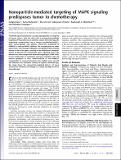Nanoparticle-mediated targeting of MAPK signaling predisposes tumor to chemotherapy
Author(s)
Mashelkar, Raghunath Anant; Chimote, Geetanjali; Soni, Shivani; Harfouche, Rania; Basu, Kaushik; Sengupta, Shiladitya; ... Show more Show less
DownloadBasu-2009-Nanoparticle-mediate.pdf (775.0Kb)
PUBLISHER_POLICY
Publisher Policy
Article is made available in accordance with the publisher's policy and may be subject to US copyright law. Please refer to the publisher's site for terms of use.
Terms of use
Metadata
Show full item recordAbstract
The MAPK signal transduction cascade is dysregulated in a majority of human tumors. Here we report that a nanoparticle-mediated targeting of this pathway can optimize cancer chemotherapy. We engineered nanoparticles from a unique hexadentate-polyD,L-lactic acid-co-glycolic acid polymer chemically conjugated to PD98059, a selective MAPK inhibitor. The nanoparticles are taken up by cancer cells through endocytosis and demonstrate sustained release of the active agent, resulting in the inhibition of phosphorylation of downstream extracellular signal regulated kinase. We demonstrate that nanoparticle-mediated targeting of MAPK inhibits the proliferation of melanoma and lung carcinoma cells and induces apoptosis in vitro. Administration of the PD98059-nanoparticles in melanoma-bearing mice inhibits tumor growth and enhances the antitumor efficacy of cisplatin chemotherapy. Our study shows the nanoparticle-mediated delivery of signal transduction inhibitors can emerge as a unique paradigm in cancer chemotherapy.
Date issued
2009-03Department
Harvard University--MIT Division of Health Sciences and TechnologyJournal
Proceedings of the National Academy of Sciences of the United States of America
Publisher
United States National Academy of Sciences
Citation
Basu, Sudipta et al. “Nanoparticle-mediated targeting of MAPK signaling predisposes tumor to chemotherapy.” Proceedings of the National Academy of Sciences 106.19 (2009): 7957-7961. © 2009 National Academy of Sciences
Version: Final published version
ISSN
1091-6490
0027-8424